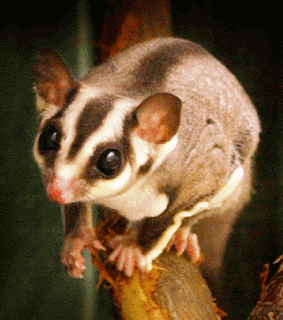Sugar Gliders are small marsupials, native to Australia,
Papua New Guinea, and Indonesia and were introduced to the United States in
1996. The average size of a Sugar Glider
is 5-7 inches, and their tails are of equal length or longer. These cute little marsupials live about 12-15
years in captivity and are nocturnal. Sugar Gliders are very social animals and
live in colonies, they communicate with each other by scent marking, barking,
hissing, sneezing, and “crabbing”.
Sugar Gliders are omnivores and eat insects, lean meats,
fruits, and vegetables. In captivity, a balanced diet with supplementation is
vital to keeping them healthy and preventing many common disease conditions as
a result of improper feeding.
Similar to the American Flying Squirrel, Sugar Gliders have
a gliding membrane that stretches from their front to hind limb, which enables
them to glide up to 50 meters! In the
wild, Sugar Gliders live in treetops and glide from tree to tree in search of
food. Their large eyes enable them to
see very well at night, making them very good hunters.
Female Sugar Gliders give birth just about 18 days after
gestation. The small under-developed
joey, approximately the size of a grain of rice, makes its way to its mother’s
pouch where they continue to develop for another 10 weeks. Sugar Gliders are very good parents, while
the joey is very young, each parent takes turns staying with them while the
other one leaves the nest to eat. Once
the Sugar Glider joey is large enough to leave the nest, they “hitch-hike” on
their parents’ backs.
Sugar Gliders are considered an exotic pet due to their size
and special dietary needs. Being
recently introduced as a household pet, there is not a lot of research on them,
and finding veterinary care can be very challenging and expensive.
Scent plays a major role in the way Sugar Gliders identify
with others in the colony and their human companions. Daily handling is
recommended and truly rewarding once they are bonded. Sugar Gliders can make
great pets with a lot of time and dedication.

